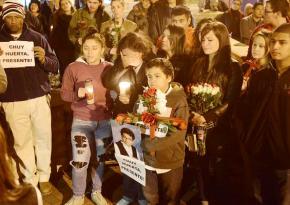Demanding justice for Chuy
, a student activist in North Carolina, reports on activists' efforts to win justice for a teenager who was shot while handcuffed and in police custody.
ON DECEMBER 19, a group of peaceful protesters in Durham, N.C., were attacked by police using tear gas, as the demonstrators held a vigil for slain 17-year old Jesus "Chuy" Huerta.
Jesus Huerta, affectionately known as "Chuy," was a 10th grader at Riverside High in Durham. On November 19, at around 2 a.m., Chuy's older sister called the police because their mother had caught Chuy using drugs, and the 17-year-old had stormed out of the family's apartment.
Chuy, at that point considered a "runaway" by police, was picked up by a rookie police officer, Samuel Duncan, around 3 a.m. about two blocks from his family's apartment.
Duncan, according to Chief of Police Jose Lopez, was going to charge Chuy with second degree trespassing. Duncan's car was parked in a remote parking lot at police headquarters when he reportedly heard a gunshot and radioed to headquarters to report "shots fired." Duncan then requested medical assistance for Chuy, who had a gunshot wound to the head and was not breathing.

According to Officer Duncan, Chuy Huerta shot himself in the head--while his hands were cuffed behind his back in the police car.
As with all police shootings in the state, the incident was turned over to the North Carolina State Board of Investigation (SBI). But the police department's initial silence about the circumstances of Chuy Huerta's death led to anger and frustration from many in the Durham community, including the Huerta family, which has repeatedly raised questions about the official story told by police.
A march was held on November 28 to protest the silence of the Durham police, as well as to demand "Justicia para Chuy" (Justice for Chuy). This first march was broken up by the police after a few protesters, who were not initially a part of the march, broke some windows at police headquarters and on a police cruiser.
According to Chuy's sister Evelin Huerta, "I was very grateful for all the people who came out, but I'm not happy about some of the people's reactions."
The questions about Chuy's death still remained, however, despite the fact that the police, with the SBI's investigative help, claimed that this young man, handcuffed in the back of the police cruiser, shot himself in the back of the head.
"I'm just more frustrated now. In what world does any of this make any sense?" Evelin Huerta told a reporter following Lopez's press conference. Not only did the announcement lead to more anger within the community, but it added to the climate of distrust in the community surrounding the Durham Police Department.
WITH MANY believing the death of Chuy Huerta to be another case of unjustified police violence against a Black or Latino man, the Huerta family and activists planned to hold monthly vigils and protests under the slogan of "Justice for Chuy." The first of these monthly actions occurred on December 19, one month to the day since Chuy's death.
A diverse group of people started the march toward the police station. "Everything was cool," at first, according to one participant. But marchers arrived at the police station only to be greeted by a fully armored phalanx of cops in riot gear. Police were reportedly attempting to prevent what happened at the first march on November 28.
Chuy's mother led the gathering with a prayer. Protesters, including some wearing black masks, were chanting when police started an arrest "countdown," claiming that CCB Plaza in downtown Durham where protesters had gathered requires a permit for demonstrations. Police then started marching forward to break up the crowd.
Participant David Kaplan told ABC Channel 11 that the weapons the police carried "didn't really look like batons or nightsticks, but they were thinner and longer, and they were reaching over the banner and whacking people with them." Police marching through the peaceful protesters tore down a banner reading, "You can crush a flower, but you can't stop the Spring."
Because of the supposed violent nature of the protesters, police decided to unleash tear gas into the crowd of some 200 people, including the elderly and children. This was reportedly triggered by some protesters throwing "bottles, rocks and various projectiles" at police. Video of the protest contradicts the police claims, but even if they were true, it would still be an egregious overreaction from people who are supposed to keep us safe.
This violent police attack marks the worst crackdown by a North Carolina police department on protesters since the days of the Occupy movement. I was disheartened to think that my friends who attended this march may have been hurt for engaging in their First Amendment right to assemble freely.
The truth is that it isn't just a few bad apples ruining the name of police. It is the whole system. We have a constitutionally protected right to peacefully assemble, but those in power don't feel the same way. It's about time that we police the police, film every encounter, start community dialogues and build a strong community based on trust to lean on for protection. It has gotten to the point where the police are no longer here for that.
Chuy Huerta, Kendrick Johnson, Jonathan Ferrell and Terrance Franklin are just a very few of the young men who were killed by police or while in police custody in 2013. When will it ever stop?
No more stolen lives. We demand justice for Chuy.


